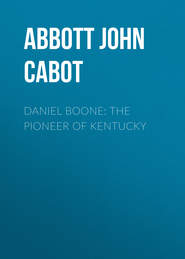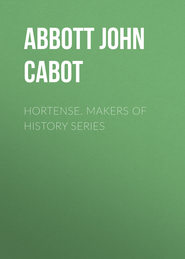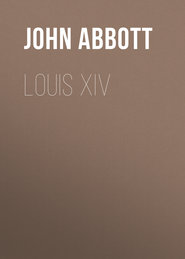По всем вопросам обращайтесь на: info@litportal.ru
(©) 2003-2024.
✖
David Crockett: His Life and Adventures
Настройки чтения
Размер шрифта
Высота строк
Поля
The woman's husband was, at the time, absent. But she carefully nursed her patient, preparing for him some soothing herb-tea. Delirium came, and for several hours, Crockett, in a state of unconsciousness, dwelt in the land of troubled dreams. The next morning he was a little more comfortable, but still in a high fever, and often delirious.
It so happened that two white men, on an exploring tour, as they passed along the trail, met the Indians, who informed them that one of their sick countrymen was at a settler's cabin at but a few miles' distance. With humanity characteristic of a new and sparsely settled country they turned aside to visit him. They proved to be old acquaintances of Crockett. He was so very anxious to get back to the camp where he had left his companions, and who, knowing nothing of his fate, must think it very strange that he had thus deserted them, that they, very reluctantly, in view of his dangerous condition, consented to help him on his way.
They made as comfortable a seat as they could, of blankets and skins, which they buckled on the neck of one of the horses just before the saddle. Upon this Crockett was seated. One of the men then mounted the saddle behind him, threw both arms around the patient, and thus they commenced their journey. The sagacious horse was left to pick out his own way along the narrow trail at a slow foot-pace. As the horse thus bore a double burden, after journeying an hour or two, Crockett's seat was changed to the other horse. Thus alternating, the painful journey of nearly fifty miles was accomplished in about two days.
When they reached the camp, Crockett, as was to have been expected, was in a far worse condition than when they commenced the journey. It was evident that he was to pass through a long run of fever, and that his recovery was very doubtful. His companions could not thus be delayed. They had already left Frazier, one of their company, perhaps to die of the bite of a venomous snake; and now they were constrained to leave Crockett, perhaps to die of malarial fever.
They ascertained that, at the distance of a few miles from them, there was another log cabin in the wilderness. They succeeded in purchasing a couple of horses, and in transporting the sick man to this humble house of refuge. Here Crockett was left to await the result of his sickness, unaided by any medical skill. Fortunately he fell into the hands of a family who treated him with the utmost kindness. For a fortnight he was in delirium, and knew nothing of what was transpiring around him.
Crockett was a very amiable man. Even the delirium of disease developed itself in kindly words and grateful feelings. He always won the love of those around him. He did not miss delicacies and luxuries of which he had never known anything. Coarse as he was when measured by the standard of a higher civilization, he was not coarse at all in the estimation of the society in the midst of which he moved. In this humble cabin of Jesse Jones, with all its aspect of penury, Crockett was nursed with brotherly and sisterly kindness, and had every alleviation in his sickness which his nature craved.
The visitor to Versailles is shown the magnificent apartment, and the regal couch, with its gorgeous hangings, upon which Louis XIV., the proudest and most pampered man on earth, languished and died. Crockett, on his pallet in the log cabin, with unglazed window and earthern floor, was a far less unhappy man, than the dying monarch surrounded with regal splendors.
At the end of a fortnight the patient began slowly to mend. His emaciation was extreme, and his recovery very gradual. After a few weeks he was able to travel. He was then on a route where wagons passed over a rough road, teaming the articles needed in a new country. Crockett hired a wagoner to give him a seat in his wagon and to convey him to the wagoner's house, which was about twenty miles distant. Gaining strength by the way, when he arrived there he hired a horse of the wagoner, and set out for home.
Great was the astonishment of his family upon his arrival, for they had given him up as dead. The neighbors who set out on this journey with him had returned and so reported; for they had been misinformed. They told Mrs. Crockett that they had seen those who were with him when he died, and had assisted in burying him.
Still the love of change had not been dispelled from the bosom of Crockett. He did not like the place where he resided. After spending a few months at home, he set out, in the autumn, upon another exploring tour. Our National Government had recently purchased, of the Chickasaw Indians, a large extent of territory in Southern Tennessee. Crockett thought that in those new lands he would find the earthly paradise of which he was in search. The region was unsurveyed, a savage wilderness, and there were no recognized laws and no organized government there.
Crockett mounted his horse, lashed his rifle to his back, filled his powder-horn and bullet-pouch, and journeying westward nearly a hundred miles, through pathless wilds whose solitudes had a peculiar charm for him, came to a romantic spot, called Shoal Creek, in what is now Giles County, in the extreme southern part of Tennessee. He found other adventurers pressing into the new country, where land was abundant and fertile, and could be had almost for nothing.
Log cabins were rising in all directions, in what they deemed quite near neighborhood, for they were not separated more than a mile or two from each other. Crockett, having selected his location on the banks of a crystal stream, summoned, as was the custom, some neighbors to his aid, and speedily constructed the cabin, of one apartment, to shield his family from the wind and the rain. Moving with such a family is not a very arduous undertaking. One or two pack-horses convey all the household utensils. There are no mirrors, bedsteads, bureaus, or chairs to be transported. With an auger and a hatchet, these articles are soon constructed in their new home. The wife, with the youngest child, rides. The husband, with his rifle upon his shoulder, and followed by the rest of the children, trudges along on foot.
Should night or storm overtake them, an hour's work would throw up a camp, with a cheerful fire in front, affording them about the same cohorts which they enjoyed in the home they had left. A little meal, baked in the ashes, supplied them with bread. And during the journey of the day the rifle of the father would be pretty sure to pick up some game to add to the evening repast.
Crockett and his family reached their new home in safety. Here quite a new sphere of life opened before the adventurer, and he became so firmly settled that he remained in that location for three years. In the mean time, pioneers from all parts were rapidly rearing their cabins upon the fertile territory, which was then called The New Purchase.
CHAPTER VII
The Justice of Peace and the Legislator
Vagabondage.—Measures of Protection.—Measures of Government.—Crockett's Confession.—A Candidate for Military Honors.—Curious Display of Moral Courage.—The Squirrel Hunt.—A Candidate for the Legislature.—Characteristic Electioneering.—Specimens of his Eloquence.—Great Pecuniary Calamity.—Expedition to the Far West.—Wild Adventures.—The Midnight Carouse.—A Cabin Reared.
The wealthy and the prosperous are not disposed to leave the comforts of a high civilization for the hardships of the wilderness. Most of the pioneers who crowded to the New Purchase were either energetic young men who had their fortunes to make, or families who by misfortune had encountered impoverishment. But there was still another class. There were the vile, the unprincipled, the desperate; vagabonds seeking whom they might devour; criminals escaping the penalty of the laws which they had violated.
These were the men who shot down an Indian at sight, as they would shoot a wolf; merely for the fun of it; who robbed the Indian of his gun and game, burned his wigwam, and atrociously insulted his wife and daughters. These were the men whom no law could restrain; who brought disgrace upon the name of a white man, and who often provoked the ignorant savage to the most dreadful and indiscriminate retaliation.
So many of these infamous men flocked to this New Purchase that life there became quite undesirable. There were no legally appointed officers of justice, no organized laws. Every man did what was pleasing in his own sight. There was no collecting of debts, no redress for violence, no punishment for cheating or theft.
Under these circumstances, there was a general gathering of the well-disposed inhabitants of the cabins scattered around, to adopt some measures for their mutual protection. Several men were appointed justices of peace, with a set of resolute young men, as constables, to execute their commissions. These justices were invested with almost dictatorial power. They did not pretend to know anything about written law or common law. They were merely men of good sound sense, who could judge as to what was right in all ordinary intercourse between man and man.
A complaint would be entered to Crockett that one man owed another money and refused to pay him. Crockett would send his constables to arrest the man, and bring him to his cabin. After hearing both parties, if Crockett judged the debt to be justly due, and that it could be paid, he would order the man's horse, cow, rifle, or any other property he owned, to be seized and sold, and the debt to be paid. If the man made any resistance he would be very sure to have his cabin burned down over his head; and he would be very lucky if he escaped a bullet through his own body.
One of the most common and annoying crimes committed by these desperadoes was shooting an emigrant's swine. These animals, regarded as so invaluable in a new country, each had its owner's mark, and ranged the woods, fattening upon acorns and other nuts. Nothing was easier than for a lazy man to wander into the woods, shoot one of these animals, take it to his cabin, devour it there, and obliterate all possible traces of the deed. Thus a large and valuable herd would gradually disappear. This crime was consequently deemed to merit the most severe punishment. It was regarded as so disgraceful that no respectable man was liable to suspicion.
The punishment for the crime was very severe, and very summary. If one of these swine-thieves was brought before Justice Crockett, and in his judgment the charge was proved against him, the sentence was—
"Take the thief, strip off his shirt, tie him to a tree, and give him a severe flogging. Then burn down his cabin, and drive him out of the country."
There was no appeal from this verdict, and no evading its execution. Such was the justice which prevailed, in this remote region, until the Legislature of Alabama annexed the territory to Giles County, and brought the region under the dominion of organized law. Crockett, who had performed his functions to the entire satisfaction of the community, then was legally appointed a justice of peace, and became fully entitled to the appellation of esquire. He certainly could not then pretend to any profound legal erudition, for at this time he could neither read nor write.
Esquire Crockett, commenting upon this transaction, says, "I was made a Squire, according to law; though now the honor rested more heavily upon me than before. For, at first, whenever I told my constable, says I, 'Catch that fellow, and bring him up for trial,' away he went, and the fellow must come, dead or alive. For we considered this a good warrant, though it was only in verbal writing.
"But after I was appointed by the Assembly, they told me that my warrants must be in real writing and signed; and that I must keep a book and write my proceedings in it. This was a hard business on me, for I could just barely write my own name. But to do this, and write the warrants too, was at least a huckleberry over my persimmon. I had a pretty well informed constable, however, and he aided me very much in this business. Indeed, I told him, when he should happen to be out anywhere, and see that a warrant was necessary, and would have a good effect, he needn't take the trouble to come all the way to me to get one, but he could just fill out one; and then, on the trial, I could correct the whole business if he had committed any error.
"In this way I got on pretty well, till, by care and attention, I improved my handwriting in such a manner as to be able to prepare my warrants and keep my record-books without much difficulty. My judgments were never appealed from; and if they had been, they would have stuck like wax, as I gave my decisions on the principles of common justice and honesty between man and man, and relied on natural-born sense, and not on law-learning, to guide me; for I had never read a page in a law-book in all my life."
Esquire Crockett was now a rising man. He was by no means diffident. With strong native sense, imperturbable self-confidence, a memory almost miraculously stored with rude anecdotes, and an astonishing command of colloquial and slang language, he was never embarrassed, and never at a loss as to what to say or to do.
They were about getting up a new regiment of militia there, and a Captain Mathews, an ambitious, well-to-do settler, with cribs full of corn, was a candidate for the colonelship. He came to Crockett to insure his support, and endeavored to animate him to more cordial cooperation by promising to do what he could to have him elected major of the regiment. Esquire Crockett at first declined, saying that he was thoroughly disgusted with all military operations, and that he had no desire for any such honors. But as Captain Mathews urged the question, and Crockett reflected that the office would give him some additional respect and influence with his neighbors, and that Major Crockett was a very pleasantly sounding title, he finally consented, and, of course, very soon became deeply interested in the enterprise.
Captain Mathews, as an electioneering measure, invited all his neighbors, far and near, to a very magnificent corn-husking frolic. There was to be a great treat on the occasion, and "all the world," as the French say, were eager to be there. Crockett and his family were of course among the invited guests. When Crockett got there he found an immense gathering, all in high glee, and was informed, much to his surprise and chagrin, that Captain Mathews's son had offered himself for the office of major, in opposition to Crockett.
The once had, in reality, but few charms for Crockett, and he did not care much for it. But this unworthy treatment roused his indignation. He was by nature one of the most frank and open-hearted of men, and never attempted to do anything by guile. Immediately he called Captain Mathews aside, and inquired what this all meant. The Captain was much embarrassed, and made many lame excuses, saying that he would rather his son would run against any man in the county than against Squire Crockett.
"You need give yourself no uneasiness about that," Crockett replied. "I care nothing for the office of major; I shall not allow my name to be used against your son for that office. But I shall do everything in my power to prevent his father from being colonel."
In accordance with the custom of the region and the times, after the feasting and the frolicking, Captain Mathews mounted a stump, and addressed the assembly in what was appropriately called a stump speech, advocating his election.
The moment he closed, Squire Crockett mounted the stump, and on the Captain's own grounds, addressing the Captain's guests, and himself one of those guests, totally unabashed, made his first stump speech. He was at no loss for words or ideas. He was full to the brim of fun. He could, without any effort, keep the whole assembly in roars of laughter. And there, in the presence of Captain Mathews and his family, he argued his total unfitness to be the commander of a regiment.
It is to be regretted that there was no reporter present to transmit to us that speech. It must have been a peculiar performance. It certainly added much to Crockett's reputation as an able man and an orator. When the election came, both father and son were badly beaten. Soon after, a committee waited upon Crockett, soliciting him to stand as candidate for the State Legislature, to represent the two counties of Lawrence and Hickman.
Crockett was beginning to be ambitious. He consented. But he had already engaged to take a drove of horses from Central Tennessee to the lower part of North Carolina. This was a long journey, and going and coming would take three months. He set out early in March, 1821. Upon his return in June, he commenced with all zeal his electioneering campaign. Characteristically he says:
"It was a bran-fire new business to me. It now became necessary that I should tell the people something about the Government, and an eternal sight of other things that I know'd nothing more about than I did about Latin, and law, and such things as that. I have said before, that in those days none of us called General Jackson the Government. But I know'd so little about it that if any one had told me that he was the Government, I should have believed it; for I had never read even a newspaper in my life, or anything else on the subject."
Lawrence County bounded Giles County on the west. Just north of Lawrence came Hickman County. Crockett first directed his steps to Hickman County, to engage in his "bran-fire" new work of electioneering for himself as a candidate for the Legislature. What ensued cannot be more graphically told than in Crockett's own language:
"Here they told me that they wanted to move their town nearer to the centre of the county, and I must come out in favor of it. There's no devil if I know'd what this meant, or how the town was to be moved. And so I kept dark, going on the identical same plan that I now find is called non-committal.
"About this time there was a great squirrel-hunt, on Duck River, which was among my people. They were to hunt two days; then to meet and count the scalps, and have a big barbecue, and what might be called a tip-top country frolic. The dinners and a general treat was all to be paid for by the party having taken the fewest scalps. I joined one side, and got a gun ready for the hunt. I killed a great many squirrels, and when we counted scalps my party was victorious.
"The company had everything to eat and drink that could be furnished in a new country; and much fun and good humor prevailed. But before the regular frolic commenced, I was called on to make a speech as a candidate, which was a business I was as ignorant of as an outlandish negro.
"A public document I had never seen. How to begin I couldn't tell. I made many apologies, and tried to get off, for I know'd I had a man to run against who could speak prime. And I know'd, too that I wasn't able to cut and thrust with him. He was there, and knowing my ignorance as well as I did myself, he urged me to make a speech. The truth is, he thought my being a candidate was a mere matter of sport, and didn't think for a moment that he was in any danger from an ignorant back woods bear-hunter.
"But I found I couldn't get off. So I determined to go ahead, and leave it to chance what I should say. I got up and told the people I reckoned they know'd what I had come for; but if not, I could tell them. I had come for their votes, and if they didn't watch mighty close I'd get them too. But the worst of all was, that I could not tell them anything about Government. I tried to speak about something, and I cared very little what, until I choked up as bad as if my mouth had been jamm'd and cramm'd chock-full of dry mush. There the people stood, listening all the while, with their eyes, mouths, and ears all open to catch every word I could speak.
"At last I told them I was like a fellow I had heard of not long before. He was beating on the head of an empty barrel on the roadside, when a traveller, who was passing along, asked him what he was doing that for? The fellow replied that there was some cider in that barrel a few days before, and he was trying to see if there was any then; but if there was, he couldn't get at it. I told them that there had been a little bit of a speech in me a while ago, but I believed I couldn't get it out.
"They all roared out in a mighty laugh, and I told some other anecdotes, equally amusing to them, and believing I had them in a first-rate way, I quit and got down, thanking the people for their attention. But I took care to remark that I was as dry as a powder-horn, and that I thought that it was time for us all to wet our whistles a little. And so I put off to a liquor-stand, and was followed by the greater part of the crowd.
"I felt certain this was necessary, for I know'd my competitor could talk Government matters to them as easy as he pleased. He had, however, mighty few left to hear him, as I continued with the crowd, now and then taking a horn, and telling good-humored stories till he was done speaking. I found I was good for the votes at the hunt; and when we broke up I went on to the town of Vernon, which was the same they wanted me to move. Here they pressed me again on the subject. I found I could get either party by agreeing with them. But I told them I didn't know whether it would be right or not, and so couldn't promise either way."
This famous barbecue was on Saturday. The next Monday the county court held its session at Vernon. There was a great gathering of the pioneers from all parts of the county. The candidates for the Governor of the State, for a representative in Congress, and for the State Legislature, were all present. Some of these men were of considerable ability, and certainly of very fluent speech. The backwoodsmen, from their huts, where there were no books, no newspapers, no intelligent companionship, found this a rich intellectual treat. Their minds were greatly excited as they listened to the impassioned and glowing utterances of speaker after speaker; for many of these stump orators had command of a rude but very effective eloquence.
Crockett listened also, with increasing anxiety. He knew that his turn was to come; that he must mount the stump and address the listening throng. He perceived that he could not speak as these men were speaking; and perhaps for the first time in his life began to experience some sense of inferiority. He writes:











